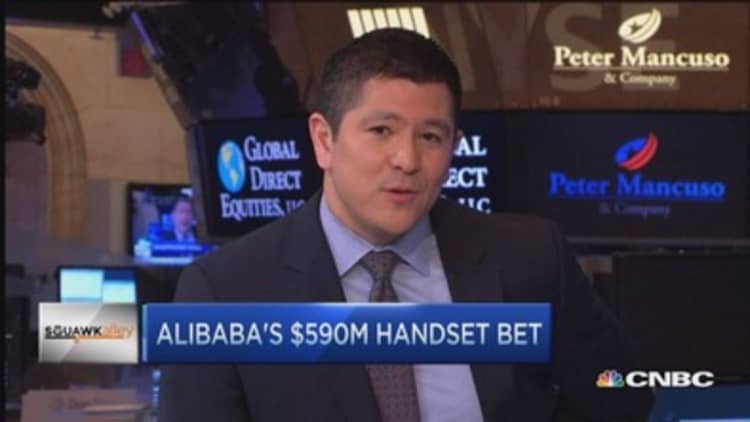
Alibaba has invested $590 million for a minority stake in a Chinese smartphone maker unknown outside its domestic market, as it looks to push its mobile software in a fiercely competitive domestic market.
The New York-listed Chinese internet giant announced the deal on Monday with smartphone maker Meizu, but did not disclose the size of the stake.
Alibaba will run its mobile operating system called, YunOS, on Meizu's devices and in return will provide "resources and support" with the aim of "developing Meizu's smartphone ecosystem", the company said in a statement. The devices will also be sold through Alibaba's ecommerce channel.
Meizu 'attraction'
But Meizu is an small and relatively obscure smartphone player. It had 1 percent market share in China in the third quarter of 2014, and shipped 1.1 million smartphones, compared to 15.6 million for Xiaomi or 13.5 million for Lenovo, according to market research company International Data Corporation. There are signs that Meizu is on a rapid expansion path, with a preliminary fourth quarter reading of its market share coming in at 2.2 percent in China, IDC said.
Meizu has developed a niche in the Chinese market for producing cheap high performance handsets.
But analysts said that Alibaba would have a greater influence over Meizu than if it has invested in a larger player like Xiaomi, allowing it to have a greater say over the direction of the company's future devices.
"A smaller company like Meizu has the nucleus for them to have a greater say over the roadmap of the company and drive that business. And that is the attraction of Meizu," Ian Fogg, head of mobile at IHS, told CNBC by phone.
'Just the beginning'
Chinese internet companies Baidu, Tencent and Alibaba are all vying for dominance in the content space in China. Selling hardware is seen as the key way for them to push out software and services such as app stores and ecommerce channels. This has been key for Xiaomi which sells high spec mid-range phones to get scale with the aim of monetizing through its software.
Alibaba's YunOS has been around since 2011 but has made no real strides in terms of penetrating smartphone users and moving them away from Google's Android OS. Alibaba started a partnership with Meizu in October to run its OS on the company's devices in a renewed effort to push consumers to its numerous services.
Read MoreWhat's up for Alibaba's mobile app strategy?
The strategy is not new for major content providers. Google acquired Motorola in 2012 to drive users to its Android services, but later sold the company to Lenovo. Amazon decided to go its own route when it unveiled its Fire Phone last June, but this has been met with poor take-up.
Alibaba's stake in Meizu will help it quickly get the scale without having to build smartphones from the start, analysts said.
"It is much better for Alibaba to acquire a company that knows the business and knows the market and then use that expertise rather than trying to build that all from scratch," Francisco Jeronimo, research director for European mobile devices at IDC, told CNBC by phone.
And Alibaba is unlikely to stop here, according to analysts, who said the Hangzhou-based company will look to take further stakes in small domestic smartphone players.
"They won't focus on one vendor. Right now Alibaba has deep pockets to be able to invest in other companies and grow a quality user base," China research director at Canalys, told CNBC by phone.
"It is only just the beginning."


